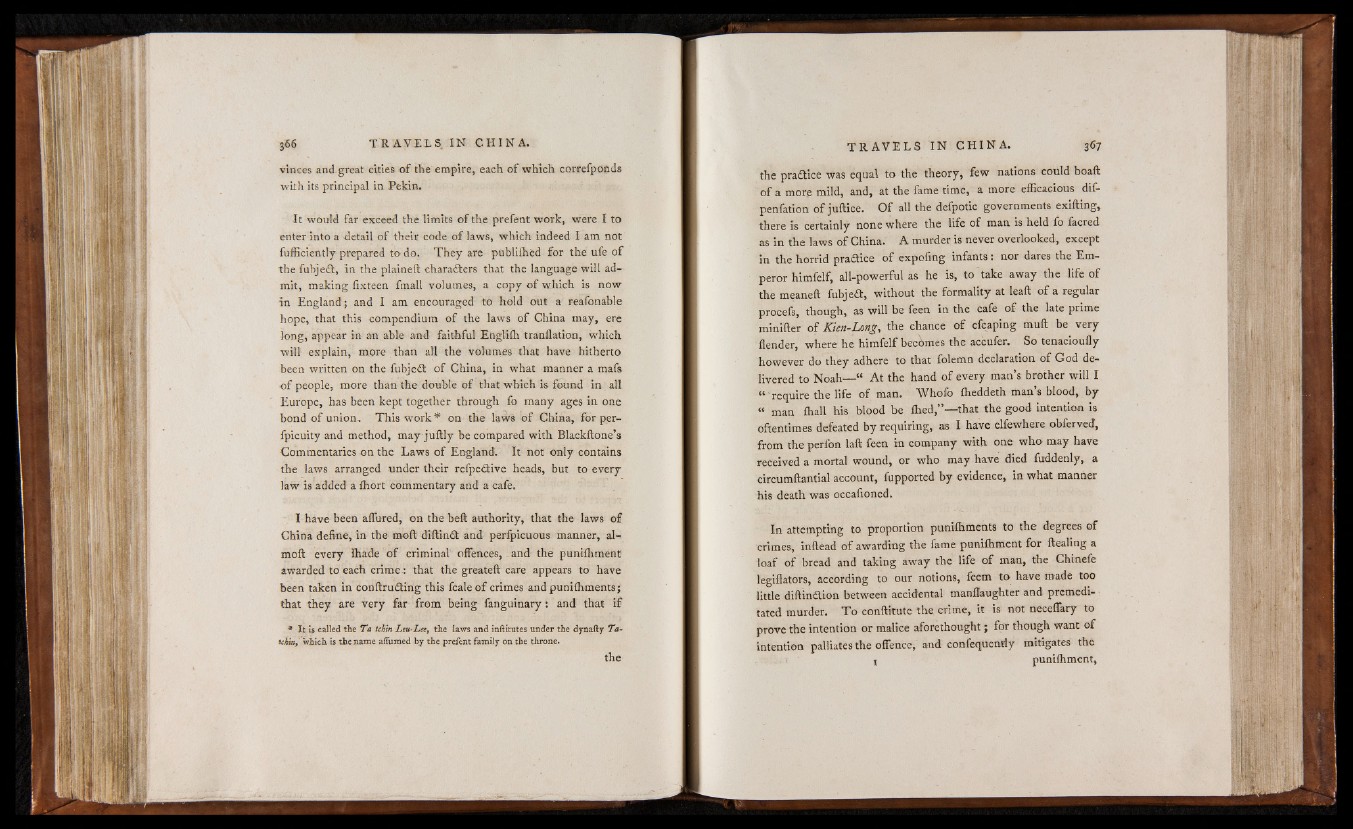
vinees and great cities o f the empire, each o f which correfponds
wirh its principal in Pekin.
It would far exceed the limits o f the prefent work, were I to
enter into a detail o f their code o f laws, which indeed I am not
fufficiently prepared to do. They are publilhed for the ufe o f
the fubjedt, in the plained charadters that the language will admit,
making fixteen fmall volumes, a copy o f which is now
in England; and I am encouraged to hold out a reafonable
hope, that this compendium o f the laws o f China may, ere
long, appear in an able and faithful Engliih tranflation, which
will explain, more than all the volumes that have hitherto
been written on the fubjedt o f China, in what manner a mafs
o f people, more than the double o f that which is found in all
Europe, has been kept together through fo many ages in one
bond o f union. This work * on the laws o f China, for per-
fpicuity and method, may juftly be compared with Blackdone’s
Commentaries on the Laws o f England. It not only contains
the laws arranged under their refpedlive heads, but to every
law is added a Ihort commentary and a cafe.
I have been allured, on the bed authority, that the laws o f
China define, in the mod didindt and perfpicuous manner, al-
mod every Ihade o f criminal' offences, and the puniihment
awarded to each crime : that the greated care appears to have
been taken in condrudting this fcaleof crimes andpunilhments;
that they are very far from being fanguinary: and that i f
* It 15 called the *Ta tchin Leu-Lee, the laws and inftitutes under the dynafty *Ta-
tcbin, whjch is the name aiTumed by the prefent family on the throne.
the
the pradtice was equal to the theory, few nations could boad
o f a mor.e mild, and, at the fame time, a more efficacious dif-
penfation o f judice. O f all the defpotic governments exiding,
there is certainly none where the life o f man is held fo facred
as in the laws o f China. A murder is never overlooked, except
in the horrid pradtice o f expofing infants: nor dares the Emperor
himfelf, all-powerful as he is, to take away the life o f
the meaned fubjedt, without the formality at lead o f a regular
procefs, though, as will be feen in the cafe o f the late prime
minlder o f Kien-Long, the chance o f efcaping mud be very
{lender, where he himfelf becomes the accufer. So tenaciouily
however do they adhere to that folemn declaration o f God delivered
to Noah— “ A t the hand o f every man’s brother will I
“ require the life o f man. Whofo iheddeth man’s blood, by
“ man ffiall his blood be died,”— that the good intention is
oftentimes defeated by requiring, as I have elfewhere obfervecf,
from the perfon lad feen in company with one who may have
received a mortal wound, or who may have died fuddenly, a
circumdantial account, fupported by evidence, in what manner
his death was occafioned.
In attempting to proportion puniffiments to the degrees of
crimes, inflead o f awarding the fame punifhment for dealing a
loaf o f bread and taking away the life o f man, the Chinefe
legiflators, according to our notions, feem to have made too
little diftin&ion between accidental manflaughter and premeditated
murder. T o conftitute the crime, it is riot neceflary to
prove the intention or malice aforethought; for though want o f
intention palliates the offence, and confequentiy mitigates the
1 punifhment,